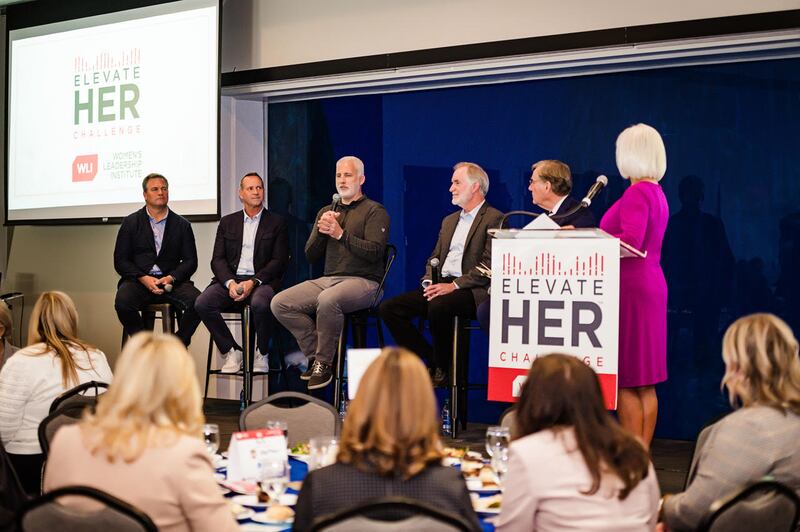Five visionary and courageous men, sitting in front of a shark tank at the Loveland Living Planet Aquarium, describing the value of gender diversity in the workplace to a group of 350 businessmen and women.
It was a celebration of companies recently committed to the ElevateHER Challenge sponsored by the Women’s Leadership Institute. Featuring an all-male panel and a shark tank behind them was risky, but it was intentional.
Rarely do you see male leaders as the focus at a women’s leadership event. In fact, I don’t recall ever seeing it.
But these are not ordinary men. Each is successfully championing the advancement of women and are changing the culture in their respective organizations in industries that are dominated in the C-Suite by men. All gave specific examples of the benefits of elevating women and building the pipeline of future female leaders.

The panel of men included Scott Anderson, president and CEO of Zions Bank (who at the event received the institute’s first annual Ally Award named after him); Joe Horton, former CEO of Primary Children’s Hospital and professor of health administration/leadership and ethics at the University of Utah and the University of Michigan; Alex Adema, CEO of DPS Skis; Jeff Weber, chief operating officer at successful tech startup Xevant; and Brett Hopkins, CEO of Garff Automotive. Each is a committed and passionate male leader making strategic progress as allies of women. And, all are partners with the Women’s Leadership Institute.
The Women’s Leadership Institute is a business-led 501(c)(3) launched eight years ago with the mission to elevate the stature of women in business and in politics. It was the vision of Anderson, who recognized that Utah’s economy, while currently doing well, could not be sustained without the talents of women in decision-making capacities.
The institute works with companies and organizations to help them understand the how and why to advance women. Nearly 300 companies throughout Utah have accepted the ElevateHER Challenge, a nonprescriptive and cost-free template for setting goals in women’s leadership. The institute partners with ElevateHER companies by providing leadership development training via the Career Development Series. A companion series, the nonpartisan Political Development Series sponsored by the institute provides in-depth training for women interested in running for political office. To date, more than 600 women have participated in these leadership development series.
The male panelists did not speak in platitudes.
Rather, they offered specific outcomes based on their focused efforts to elevate women. Despite initial skepticism, Hopkins cited a significant increase in employee retention at Garff Automotive, especially among females. Research shows that women in leadership improve employee morale, reduce turnover and bolster the return on investment of companies.
Adema, representing the outdoor industry, told the audience to “look where you have influence and leverage that to spread the word about why and how this is important.” Horton demonstrated his steeped leadership acumen, saying that “excellence is idiosyncratic” and that women bring unique life experiences and skills to the table.
Helping women get back into the workforce post-pandemic through returnship programs was mentioned by female ally and institute board member Weber of tech startup, Xevant. Finally, Anderson underscored the importance of becoming mentors and sponsors of women. “More than an ally, become a sponsor for someone else. Open opportunities they might not have access to and develop introductions and connections for them.”
With their silhouettes in front of the aquarium’s tank filled with swimming sharks, I couldn’t help but notice the juxtaposition of the work of these visionary men. All expressed humility and a slice of imposter syndrome as they communicated the benefits of elevating women in leadership.
I am often asked what makes the Women’s Leadership Institute successful. Having led the organization since its inception nearly eight years ago, I say it is the inclusion of men as allies and advocates of women and a positive message that communicates the business case for women’s leadership without blame or shame of men.
Patricia Jones is the CEO of the Women’s Leadership Institute.


